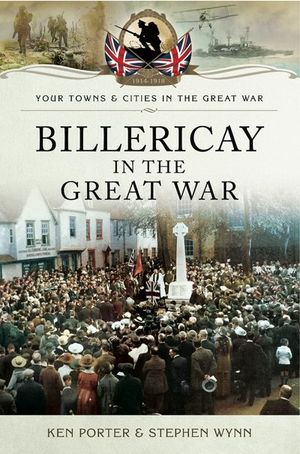Billericay in the Great War
Stephen Wynn Follow this author
Follow this author
Published by Pen & Sword Books
In 1914 Billericay was a peaceful compact village of about 2000 inhabitants. There was the High Street, Back Street, which today is called Chapel Street, and Back Lane which is now Western Road. Within half a mile of the High Street there were groups of cottages; Sun Street had some, which are still there today. There were others in Laindon Road at the beginning before you come to the Roman Catholic Church, and Stock Road, along with Norsey Road and Western Road. All of this policed by a couple of local Constables.In London Road there was Hodges Farm and others along Laindon Road where it verges on to Little Burstead, Norsey Road, Stock Road and Jacksons Lane. The roads back then were no more than dirt roads. They weren't flat and smooth and made of tar, but luckily horses were still king of the road.In 1914, between the bottom end of the High Street and the top end at Sun Street, there were only a total of 54 premises including private houses shops, pubs, a bank, Post Office, the Police station, two Blacksmiths, the undertakers, a school and a Church. The war began in August of that year and like the pace of life in the village, it started slowly for the people of Billericay. To start with it was something which they only read about in the newspapers. During the war soldiers started to be billeted in the town. There was an Army camp in Mountnessing Road opposite Station Road for the ordinary soldier, but the officers were billeted in people's houses. Initially there was excitement and enthusiasm about the war but when some of the local men who had gone off to fight in it were getting killed, suddenly it became very real and personal as local families started losing loved onesSeptember 1916 saw a Zeppelin crash in a field at nearby Great Burstead. The burnt and disfigured remains of the German airmen left nobody in doubt just of how real and painful the war was.'February 1918 even saw German soldiers come to the town as Prisoners of war interned in the local Billericay Work House. They were the enemy, but not monsters, just ordinary men like those from Billericay who had gone off to fight in a war that they most probably didn't want to be fighting in. When it was all over some would return to their families to get on with their lives and for the ones who didn't make it back, there would be the commemoration of their names on a war memorial for generations to remember forever more.
BUY NOW FROM
COMMUNITY REVIEWS

